How To Invest By Instinct: Instinctively Self Guided Investments with Lin Eldridge
$6.00
File Size: Coming soon!
Delivery Time: 1–12 hours
Media Type: Online Course
Content Proof: Watch Here!
You may check content proof of “How To Invest By Instinct: Instinctively Self Guided Investments with Lin Eldridge” below:

How To Invest By Instinct: Instinctively Self-Guided Investments with Lin Eldridge
Investing can be a daunting task, but what if you could rely on your instincts to guide your investment decisions? Lin Eldridge’s approach to self-guided investments emphasizes the power of intuition. In this article, we’ll explore how to harness your instincts for successful investing.
What is Instinctive Investing?
Instinctive investing involves using your intuition and gut feelings to make investment decisions. It’s about trusting your natural inclinations rather than relying solely on data and analysis.
Why Trust Your Instincts?
- Experience and Knowledge: Your instincts are often based on your experiences and knowledge, even if you’re not consciously aware of it.
- Quick Decision-Making: Instincts allow for faster decision-making, which can be crucial in volatile markets.
- Emotional Intelligence: Instinctive investing taps into your emotional intelligence, helping you navigate market psychology.
Lin Eldridge’s Philosophy on Instinctive Investing
Lin Eldridge advocates for a balanced approach that combines instinct with informed decision-making. According to Eldridge, instincts should complement, not replace, traditional investment strategies.
Understanding Market Trends
- Pattern Recognition: Use your instincts to recognize patterns in market behavior.
- Historical Context: Trust your gut when comparing current trends with historical data.
Diversifying Your Portfolio
Instinctive investors should still diversify their portfolios to mitigate risk. Use your instincts to identify promising sectors and asset classes.
Steps to Develop Your Instincts for Investing
1. Educate Yourself
- Read Widely: Gain a broad understanding of financial markets.
- Follow Experts: Learn from successful investors and financial advisors.
2. Practice Mindfulness
- Stay Present: Mindfulness practices can help you stay in the moment and tune into your instincts.
- Reduce Stress: Lower stress levels to enhance your decision-making abilities.
3. Reflect on Past Decisions
- Analyze Outcomes: Reflect on your past investment decisions to understand your instincts better.
- Identify Patterns: Look for patterns in your successful and unsuccessful investments.
Balancing Instincts with Analysis
While instincts are valuable, they should be balanced with thorough analysis. Use data to support your intuitive decisions.
Quantitative Analysis
- Financial Metrics: Evaluate financial statements and key metrics.
- Market Indicators: Pay attention to market indicators and trends.
Qualitative Analysis
- Company Management: Trust your instincts about a company’s leadership.
- Industry Outlook: Use your intuition to gauge the future potential of industries.
Common Mistakes in Instinctive Investing
Overconfidence
- Risk Awareness: Don’t let overconfidence lead to excessive risk-taking.
- Seek Feedback: Regularly seek feedback from trusted advisors.
Ignoring Data
- Data Integration: Always integrate data with your instincts.
- Stay Informed: Keep up-to-date with market news and reports.
Real-Life Examples of Instinctive Investors
Successful Instinctive Investors
- Warren Buffett: Known for his intuitive investment style, Buffett combines instinct with rigorous analysis.
- George Soros: Soros often trusts his gut feelings about market movements.
Developing Your Instinctive Investment Strategy
Set Clear Goals
- Define Objectives: Know what you want to achieve with your investments.
- Time Horizon: Consider your investment time horizon.
Regularly Review Your Portfolio
- Monitor Performance: Keep an eye on your portfolio’s performance.
- Adjust as Needed: Be willing to make adjustments based on your instincts and analysis.
Conclusion
Investing by instinct is about harnessing your natural inclinations while balancing them with informed decision-making. Lin Eldridge’s approach to self-guided investments can help you develop a more intuitive and effective investment strategy. Trust your instincts, but never ignore the importance of data and analysis.
FAQs
1. Can anyone develop instinctive investing skills?
Yes, with practice and education, anyone can hone their instinctive investing skills.
2. How can I improve my investment instincts?
Educate yourself, practice mindfulness, and reflect on past investment decisions.
3. Are there risks to relying on instincts for investing?
Yes, overconfidence and ignoring data can lead to poor decisions. Balance instincts with analysis.
4. What role does emotional intelligence play in instinctive investing?
Emotional intelligence helps you understand market psychology and make better intuitive decisions.
5. Can instinctive investing replace traditional strategies?
No, it should complement traditional strategies, not replace them.
Be the first to review “How To Invest By Instinct: Instinctively Self Guided Investments with Lin Eldridge” Cancel reply
You must be logged in to post a review.
Related products
Forex Trading
Quantamentals – The Next Great Forefront Of Trading and Investing with Trading Markets
Forex Trading
Forex Trading
Forex Trading
Forex Trading
Forex Trading























Reviews
There are no reviews yet.